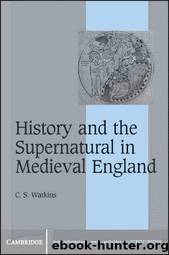History and the Supernatural in Medieval England (Cambridge Studies in Medieval Life and Thought: Fourth Series) by C. S. Watkins

Author:C. S. Watkins [Watkins, C. S.]
Language: eng
Format: mobi
Publisher: Cambridge University Press
Published: 2007-12-12T16:00:00+00:00
Divination
Where the manipulation of occult virtues and natural properties could involve dubious means and doubtful ends, there was a greater theological difficulty in efforts to discern the future.[54] The Old Testament, with its attacks on wizards, interpreters of omens and soothsayers offered a scriptural basis for criticisms which found expression in two principal objections formulated in the churchâs official teachings. Both focused on the affront these individuals delivered to faith.[55] First, it was argued that divination intimated that the pattern of future events might be predetermined, an idea which could have unacceptable consequences for beliefs about Godâs freedom of action. Secondly, efforts to see, and perhaps to modify, the future implied manâs distrust of divine providence.[56] Fundamental objections of this kind filtered down through early medieval law codes and penitential manuals, which incorporated lists of prohibited divinatory practices ranging from sortilegia to augury and aruspicia.[57] A similar pattern of hostility to these arts developed in canon law, synodal legislation, penitentials and exempla of the twelfth and early thirteenth centuries.[58]
Yet, despite the clarity of the theoretical objections and the precision with which normative texts listed forbidden forms of prognostication, in practice it proved much more difficult to anathematise efforts to discern the future. As we have seen, the church freely embraced the idea that God might show signs or send prophecies to the faithful which disclosed his intentions. These had the deepest and most impeccable scriptural credentials. Old and New Testaments were stuffed with signa and the Old Testament, though harshly critical of most divination, tolerated cleromancy (a species of lot-casting performed by priests) and some oneiromancy (interpretation of dreams). The same pattern emerged in the writings of the early Fathers. As Valerie Flint has shown, they offered ambivalent guidance about the acceptability of prognostication.[59] Although generally hostile to divination, Augustine rejected the idea that men could have no knowledge of future events and both he and Isidore of Seville entertained the notion that some forms of astrology and Christianised lot-casting â such as the sortes sanctorum (a strategy which involved lighting candles to a selection of saints and seeing which burnt the longest) or sortes biblicae (in which prognostics were taken from the Bible) â might be acceptable.
In the central middle ages, we occasionally find churchmen trying to row back against this tide of concession. Herbert Losinga tried to tackle those tricky archetypes of the âgoodâ astrologer, the magi of the gospels, in one of his sermons. He contended, making use of an argument deployed by Isidore of Seville, that the science of the stars was needed then but was redundant now: the wise men âbeing ignorant of spiritual things were led by outward signsâ but in his own day the faithful âare enlightened by the daily shining of holy lessonsâ and so did not need to place their trust in prognostication.[60] Despite Herbertâs clever words, continued accommodation remained more common in the central middle ages than this sort of intellectual retrenchment. Indeed, some species of divination had become firmly embedded in orthopraxis.
Download
This site does not store any files on its server. We only index and link to content provided by other sites. Please contact the content providers to delete copyright contents if any and email us, we'll remove relevant links or contents immediately.
| Africa | Americas |
| Arctic & Antarctica | Asia |
| Australia & Oceania | Europe |
| Middle East | Russia |
| United States | World |
| Ancient Civilizations | Military |
| Historical Study & Educational Resources |
Magic and Divination in Early Islam by Emilie Savage-Smith;(1533)
Papillon by Henry Charrière(1430)
Bohemians, Bootleggers, Flappers, and Swells: The Best of Early Vanity Fair by Bohemians Bootleggers Flappers & Swells- The Best of Early Vanity Fair (epub)(1402)
Ambition and Desire: The Dangerous Life of Josephine Bonaparte by Kate Williams(1387)
Twelve Caesars by Mary Beard(1314)
Operation Vengeance: The Astonishing Aerial Ambush That Changed World War II by Dan Hampton(1162)
What Really Happened: The Death of Hitler by Robert J. Hutchinson(1161)
London in the Twentieth Century by Jerry White(1145)
The Japanese by Christopher Harding(1131)
Time of the Magicians by Wolfram Eilenberger(1125)
Twilight of the Gods by Ian W. Toll(1117)
Lenin: A Biography by Robert Service(1074)
The Devil You Know by Charles M. Blow(1024)
A Social History of the Media by Peter Burke & Peter Burke(976)
Freemasons for Dummies by Hodapp Christopher;(964)
Napolean Hill Collection by Napoleon Hill(942)
Henry III by David Carpenter;(919)
The Rise and Triumph of the Modern Self by Unknown(913)
Richard III (The English Monarchs Series) by Charles Ross(908)
